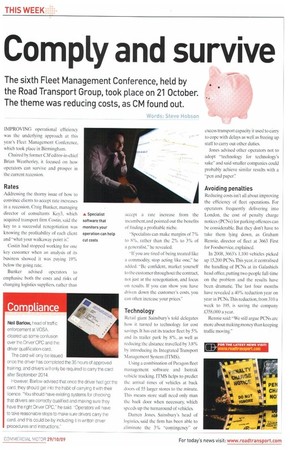Comply and survive
Page 10

If you've noticed an error in this article please click here to report it so we can fix it.
The sixth Fleet Management Conference, held by the Road Transport Group, took place on 21 October. The theme was reducing costs, as CM found out.
Words: Steve Hobson
IMPROVING operational efficiency was the underlying approach at this year's Fleet Management Conference, which took place in Birmingham.
Chaired by former CM editor-in-chief Brian Weatherley, it focused on how operators can survive and prosper in the current recession.
Rates
Addressing the thorny issue of how to convince clients to accept rate increases in a recession, Craig Bunker. managing director of consultants Key3, which acquired transport firm Costin, said the key to a successful renegotiation was knowing the profitability of each client and "what your walkaway point is'.'
Costin had stopped working for one key customer when an analysis of its business showed it was paying 19% below the going rate.
Bunker advised operators to emphasise both the costs and risks of changing logistics suppliers, rather than accept a rate increase from the incumbent,and pointed out the benefits of finding a profitable niche.
"Specialists can make margins of 7% to 8%, rather than the 2% to 3% of a generalist," he revealed.
If you are tired of being treated like a commodity. stop acting like one," he added. "Be confident, market yourself to the customer throughout the contract, not just at the renegotiation, and focus on results. If you can show you have driven down the customer's costs, you can often increase your prices."
Technology
Retail giant Sainsbury's told delegates how it turned to technology for cost savings. It has cut its tractor fleet by 5% and its trailer park by 8%, as well as reducing the distance travelled by 3.8% by introducing its Integrated Transport Management System (ITMS).
Using a combination of Paragon fleet management software and Isotrak vehicle tracking. ITMS helps to predict the arrival times of vehicles at back doors of 55 larger stores to the minute. This means store staff need only man the back door when necessary, which speeds up the turnaround of vehicles.
Darren Jones. Sainsbury's head of logistics, said the firm has been able to eliminate the 3% "contingency," or
excess transport capacity it used to carry to cope with delays as well as freeing up staff to carry out other duties.
Jones advised other operators not to adopt "technology for technology's sake" and said smaller companies could probably achieve similar results with a "pen and paper
Avoiding penalties
Reducing costs isn't all about improving the efficiency of fleet operations. For operators frequently delivering into London, the cost of penalty charge notices (PCNs) for parking offences can be considerable. But they don't have to take them lying down, as Graham Rennie, director of fleet at 3663 First for Foodservice, explained.
In 2008, 3663's 1,100 vehicles picked up 15,200 PCNs. This year, it centralised the handling of PCNs at its Galashiels head office, putting two people full-time on the problem and the results have been dramatic. The last four months have revealed a 40% reduction year on year in PCNs This reduction, from 310 a week to 195, is saving the company £358.000 a year.
Rennie said: "We still argue PCNs are more about making money than keeping traffic moving."
(—By FOR THE LATEST NEWS vism www•Poadtransport.com








































































































































